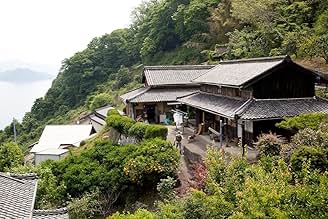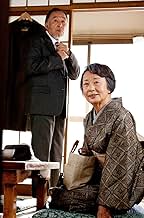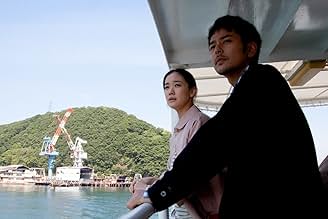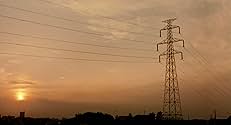IMDb-BEWERTUNG
7,5/10
2312
IHRE BEWERTUNG
Füge eine Handlung in deiner Sprache hinzuIn this update of Yasujiro Ozu's "Tokyo Story", a retired schoolteacher and his wife visit their three working children in modern-day Tokyo.In this update of Yasujiro Ozu's "Tokyo Story", a retired schoolteacher and his wife visit their three working children in modern-day Tokyo.In this update of Yasujiro Ozu's "Tokyo Story", a retired schoolteacher and his wife visit their three working children in modern-day Tokyo.
- Regie
- Drehbuch
- Hauptbesetzung
- Auszeichnungen
- 2 Gewinne & 16 Nominierungen insgesamt
Empfohlene Bewertungen
Legendary Japanese filmmaker remakes (or perhaps retells?) one of the most famous Japanese movies of all time, Tokyo Story, approximately 60 years after its release, with a very similar plot but a very different modern day setting. It does, in a way, highlight how timeless the themes are surrounding getting old and what happens when a family starts to reject or ignore its eldest members that were already well explored by the original classic.
It's arguably not a necessary remake because of how well the first still holds up, but Yamada shoots it well, as always, and gets naturalistic, compelling performances out of his fairly large cast. Hitting the same beats as the first and having similar strengths and a very comparable slow pace does make watching this feel more than a little familiar at times, even if it's been years and years since you've seen the original (like my personal experience).
Yamada clearly has a lot of love for the original, and it shaped his style and many of his films that he's been making for nearly 60 years now, so maybe it doesn't matter how relevant the audience thinks it is? If he did it for himself, and because he wanted to tribute that original, then he's earned the right to do that, in all honesty.
Thankfully, those choosing to watch will still experience quite a nice film (although it is better to watch the original first, and then maybe check this one out too, if you liked it).
It's arguably not a necessary remake because of how well the first still holds up, but Yamada shoots it well, as always, and gets naturalistic, compelling performances out of his fairly large cast. Hitting the same beats as the first and having similar strengths and a very comparable slow pace does make watching this feel more than a little familiar at times, even if it's been years and years since you've seen the original (like my personal experience).
Yamada clearly has a lot of love for the original, and it shaped his style and many of his films that he's been making for nearly 60 years now, so maybe it doesn't matter how relevant the audience thinks it is? If he did it for himself, and because he wanted to tribute that original, then he's earned the right to do that, in all honesty.
Thankfully, those choosing to watch will still experience quite a nice film (although it is better to watch the original first, and then maybe check this one out too, if you liked it).
Yamada Yoji has been directing films since 1961, but internationally is best known for his late-career "Samurai Trilogy" (2002 - 2006). There is always a heavy dose of nostalgia in his films and this one is no exception! Director Yoji Yamada delayed principal photography of Tokyo Kazoku, a remake of Yasujiro Ozu's Tokyo Story, from the beginning of April 2011 due to the devastating Tohoku earthquake and tsunami, and subsequent Fukushima meltdown, which occurred on March 11th 2011... from the beginning nothing was going easy!
Remaking a film like "Tokyo monogotari" (Tokyo Story, 1954), the Ozu film that is repeatedly voted to be the greatest film of all time, was very challenging task. I love the result - re-imagining of the original, with contemporary setting and some differences which could be almost called improvements!
Likeable faces with excellent acting skills, combined with great camera work and interesting cinematography revoking some old Ozu styles. As well as great directing, made this family drama one of the best ones coming from Japan.
Remaking a film like "Tokyo monogotari" (Tokyo Story, 1954), the Ozu film that is repeatedly voted to be the greatest film of all time, was very challenging task. I love the result - re-imagining of the original, with contemporary setting and some differences which could be almost called improvements!
Likeable faces with excellent acting skills, combined with great camera work and interesting cinematography revoking some old Ozu styles. As well as great directing, made this family drama one of the best ones coming from Japan.
To understand how this film came about, you got to know a little bit of background about the director, Yamada Yoji. Though he may be internationally best known for his late-career "Samurai Trilogy" (2002 - 2006), Yamada has been directing films since 1961, and is best known for films that are set in the contemporary present, but feature a heavy dose of nostalgia. Yamada started his career at Shochiku, the same studio where Ozu worked. Though he initially tried to make films very opposite to the Ozu style, he came to be compared to Ozu time and time again, as the years went on. Yamada himself blames the Kamata studio style, which is present in the films of many older Shochiku directors.
I like Yamada quite a bit, though he is nowhere near the master of cinema that Ozu was. The core difference between them is that Ozu depicted the sentiments of his contemporary society. Yamada's films have very similar sentiments, but from a nostalgic viewpoint. Less "mono no aware" and more of a longing to a childhood home, tragicomic everyday realism with warm undertones and soft narratives. At his darkest, Yamada is not as dark as Ozu, and at his funniest, he is not as hilarious. He is good, balanced, and humane, and his works benefit if you don't compare the two.
But I guess Yamada couldn't help himself from eventually remaking an Ozu film, after making Ozu-esque films for 52 years (!). "Tôkyô kazoku" (Tokyo Family, 2013) is a remake of "Tokyo monogotari" (Tokyo Story, 1954), the Ozu film that is repeatedly voted to be the greatest film of all time. Because of the casual nature of the the narrative, it is not exactly like remaking "Vertigo" (1958) or "Citizen Kane" (1941), but you've got to admit: it's a challenge. Instead of making a scene-for-scene remake (god forbid!), this is more of a re-imagining of the original, with contemporary setting and some differences made.
I came in with an open mind, and the initial reaction was good. The original Ozu film was in black and white, Yamada's film is in color, but he has chosen a color palette that resembles that of Ozu's late-career color films like "Ohayo" (Good Morning, 1959). In hindsight, Yamada would have been wise to remake "Ohayo" instead. "Ohayo" is a comedic and pretty relaxed narrative, a good fit for Yamada, and in itself a remake of an earlier Ozu film (1932). It could have been updated, just change the television set of the 1959 film into a computer, or an iPhone or something. Not necessary a masterwork, but Yamada could manage the tone. "Tokyo Story" is too dark for Yamada. Ozu described it as one of his most melodramatic pictures, and Yamada's softball approach does not resonate with the narrative. The dramatic tension is not very high, and we feel too much sympathy for every single character.
The original film was told largely from the perspective of the parents who come to visit their adult children in Tokyo. This film does the opposite, and starts with the children. Therefore we come to understand their perspective too much, and they are made too kind for the film's core thesis to come through. Yamada's film is cozy and the nostalgia he has for the olden day family idyll goes opposite to Ozu's thematic about the selfishness of the modern generation. Because the drama doesn't bite, the film starts to feel slow, which is something I never felt with any Ozu film, though they were long. I feel bad watching this, because Yamada is talented and can do several things very well. This film highlights what he can't do.
All this being said, the film carries some charm from the original, though it doesn't add much. Some scenes have become too iconic to change, and are thus too similar to the originals. The acting is very good throughout, as Yamada films are always full of likable faces.
I like Yamada quite a bit, though he is nowhere near the master of cinema that Ozu was. The core difference between them is that Ozu depicted the sentiments of his contemporary society. Yamada's films have very similar sentiments, but from a nostalgic viewpoint. Less "mono no aware" and more of a longing to a childhood home, tragicomic everyday realism with warm undertones and soft narratives. At his darkest, Yamada is not as dark as Ozu, and at his funniest, he is not as hilarious. He is good, balanced, and humane, and his works benefit if you don't compare the two.
But I guess Yamada couldn't help himself from eventually remaking an Ozu film, after making Ozu-esque films for 52 years (!). "Tôkyô kazoku" (Tokyo Family, 2013) is a remake of "Tokyo monogotari" (Tokyo Story, 1954), the Ozu film that is repeatedly voted to be the greatest film of all time. Because of the casual nature of the the narrative, it is not exactly like remaking "Vertigo" (1958) or "Citizen Kane" (1941), but you've got to admit: it's a challenge. Instead of making a scene-for-scene remake (god forbid!), this is more of a re-imagining of the original, with contemporary setting and some differences made.
I came in with an open mind, and the initial reaction was good. The original Ozu film was in black and white, Yamada's film is in color, but he has chosen a color palette that resembles that of Ozu's late-career color films like "Ohayo" (Good Morning, 1959). In hindsight, Yamada would have been wise to remake "Ohayo" instead. "Ohayo" is a comedic and pretty relaxed narrative, a good fit for Yamada, and in itself a remake of an earlier Ozu film (1932). It could have been updated, just change the television set of the 1959 film into a computer, or an iPhone or something. Not necessary a masterwork, but Yamada could manage the tone. "Tokyo Story" is too dark for Yamada. Ozu described it as one of his most melodramatic pictures, and Yamada's softball approach does not resonate with the narrative. The dramatic tension is not very high, and we feel too much sympathy for every single character.
The original film was told largely from the perspective of the parents who come to visit their adult children in Tokyo. This film does the opposite, and starts with the children. Therefore we come to understand their perspective too much, and they are made too kind for the film's core thesis to come through. Yamada's film is cozy and the nostalgia he has for the olden day family idyll goes opposite to Ozu's thematic about the selfishness of the modern generation. Because the drama doesn't bite, the film starts to feel slow, which is something I never felt with any Ozu film, though they were long. I feel bad watching this, because Yamada is talented and can do several things very well. This film highlights what he can't do.
All this being said, the film carries some charm from the original, though it doesn't add much. Some scenes have become too iconic to change, and are thus too similar to the originals. The acting is very good throughout, as Yamada films are always full of likable faces.
9/10
watched an amazing film this morning just when i was trying to get to sleep after another "up till sunrise" night it's called Tokyo Family by Yôji Yamada, a tribute to legendary Japanese director Yasujirô Ozu and his most famous film, Tokyo Story from 1953 it's quite similar in idea, where older parents from a country sea side town come to Tokyo to visit their kids / grand kids, but no one really has time for them Tokyo has this high paced way of living, while in the country the old folks just kick back and enjoy life go by
the relationship between the father and son reminded me of my situation with dad who recently passed away - my personality & outlook in life is like mine while the fathers is like my dad also there's a death in the film where the whole family has to go thru, very sudden like dad's circumstances
it destroyed me, but in a good way cause it allowed be to grieve a bit more, cause I've been resisting it a bit since dad's funeral it really is a heart breaking film, and like death it is hard for all family members to endure in the film the funeral & wake were very beautiful, respectful all the family got together like we all did it finishes on a positive note that life must go on, the father becomes more accepting of the son & vice versa thru this death in the family they break their stand off between each other and bond in their own unique way
instant 9/10 & keen to watch it again u should too, to see the contrasts between generations, traditions & cities old times compared to modern times something that will be timeless, just like Yamada modernising the Ozu 50s masterpiece with another masterpiece that will be also treasured for generations to come
watched an amazing film this morning just when i was trying to get to sleep after another "up till sunrise" night it's called Tokyo Family by Yôji Yamada, a tribute to legendary Japanese director Yasujirô Ozu and his most famous film, Tokyo Story from 1953 it's quite similar in idea, where older parents from a country sea side town come to Tokyo to visit their kids / grand kids, but no one really has time for them Tokyo has this high paced way of living, while in the country the old folks just kick back and enjoy life go by
the relationship between the father and son reminded me of my situation with dad who recently passed away - my personality & outlook in life is like mine while the fathers is like my dad also there's a death in the film where the whole family has to go thru, very sudden like dad's circumstances
it destroyed me, but in a good way cause it allowed be to grieve a bit more, cause I've been resisting it a bit since dad's funeral it really is a heart breaking film, and like death it is hard for all family members to endure in the film the funeral & wake were very beautiful, respectful all the family got together like we all did it finishes on a positive note that life must go on, the father becomes more accepting of the son & vice versa thru this death in the family they break their stand off between each other and bond in their own unique way
instant 9/10 & keen to watch it again u should too, to see the contrasts between generations, traditions & cities old times compared to modern times something that will be timeless, just like Yamada modernising the Ozu 50s masterpiece with another masterpiece that will be also treasured for generations to come
This film is a 2013 color re-make of Yasujiro Ozu's 1953 "Tokyo Story," that was voted the #1 film by directors in the 2012 Sight and Sound poll. The plot lines and characters are very similar with some distinct differences; even some lines of dialogue are the same or very similar. The biggest difference is that while Noriko in the 1953 film is the daughter-in-law of the elderly couple, whose son was killed in WWII, Noriko in the 2013 film is the future daughter-in-law engaged to the elderly second couple's son (much more developed in this film, not in a flattering way). In addition, the incomparable Setsuko Hara, known as the Japanese Garbo, played Noriko in the 1953 film and brought to the role a transcendent luminosity of compassion and wisdom. Secondly, while Ozu had a distinct cinematographic style of usually having the camera directly in front of the characters while they spoke, we see this much less frequently in the 2013 film. These are just a few of the differences. Overall, it is an interesting re-make, but Ozu's "Tokyo Story" is still one of the greatest films ever made.
Wusstest du schon
- WissenswertesDirector Yoji Yamada delayed principal photography of Tokyo Kazoku, a remake of Yasujiro Ozu's Tokyo Story, from the beginning of April 2011 due to the devastating Tohoku earthquake and tsunami, and subsequent Fukushima meltdown, which occurred on March 11th 2011. He would have to recast the film and partly reworked the script to reflect post-3/11 Japan.
- VerbindungenReferenced in Kazoku wa tsuraiyo (2016)
Top-Auswahl
Melde dich zum Bewerten an und greife auf die Watchlist für personalisierte Empfehlungen zu.
- How long is Tokyo Family?Powered by Alexa
Details
- Erscheinungsdatum
- Herkunftsland
- Offizieller Standort
- Sprache
- Auch bekannt als
- Токійська родина
- Produktionsfirmen
- Weitere beteiligte Unternehmen bei IMDbPro anzeigen
Box Office
- Weltweiter Bruttoertrag
- 17.370.130 $
- Laufzeit2 Stunden 26 Minuten
- Farbe
- Sound-Mix
- Seitenverhältnis
- 1.85 : 1
Zu dieser Seite beitragen
Bearbeitung vorschlagen oder fehlenden Inhalt hinzufügen




























